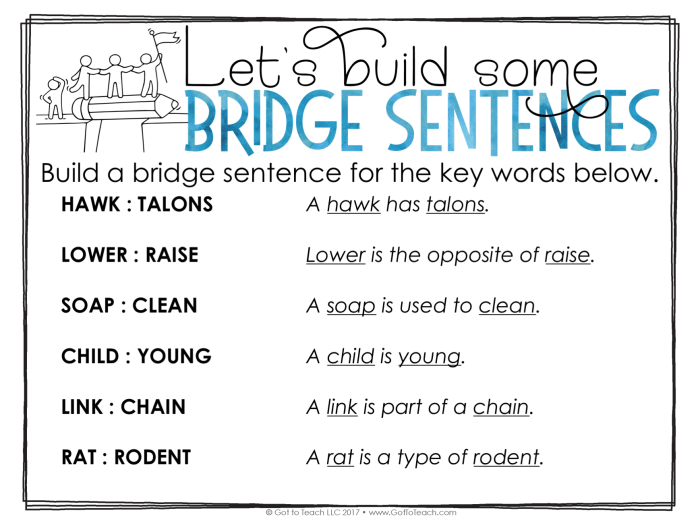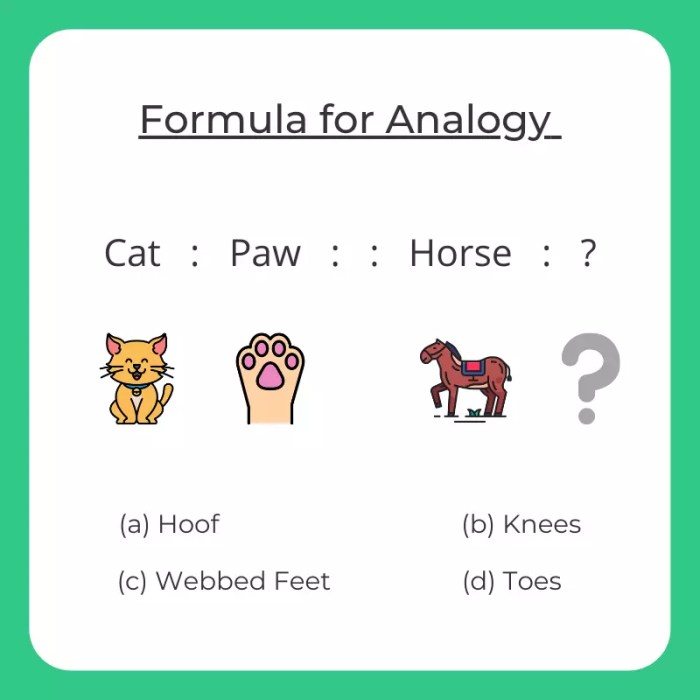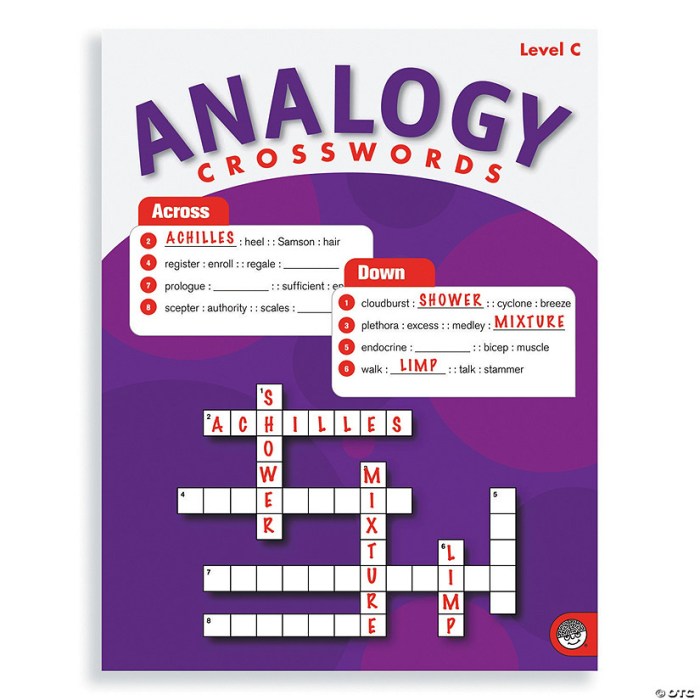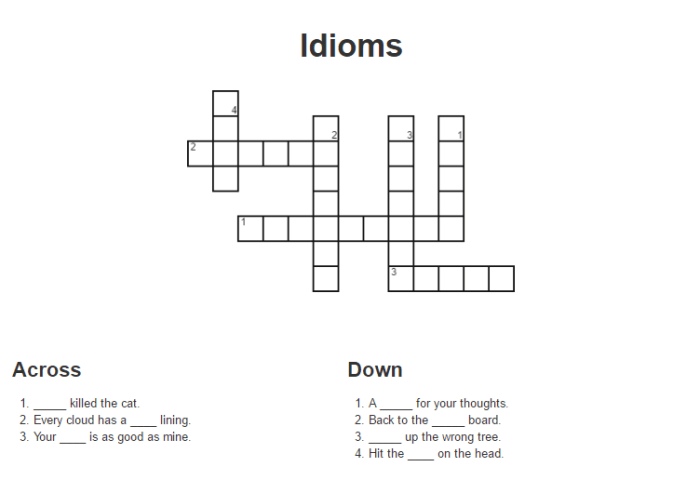Words in an analogy crossword – Words in analogy crosswords are a captivating blend of language, logic, and wordplay that challenges our minds and expands our vocabulary. Dive into the intriguing world of analogy crosswords, where each solved puzzle unveils the intricate relationships between words, revealing the hidden connections that shape our language.
From understanding the types of word relationships to mastering solving techniques, this comprehensive guide will equip you with the knowledge and strategies to conquer the world of analogy crosswords.
Word Relationships: Words In An Analogy Crossword

Analogy crosswords rely heavily on understanding the relationships between words. These relationships can take various forms, each requiring a different approach to solving the puzzle.
Common types of word relationships found in analogy crosswords include:
- Synonym: Two words with similar meanings (e.g., “happy” and “joyful”).
- Antonym: Two words with opposite meanings (e.g., “hot” and “cold”).
- Part-whole: One word is a part of the other (e.g., “finger” and “hand”).
- Whole-part: One word is the whole of the other (e.g., “car” and “wheel”).
- Cause-effect: One word is the cause of the other (e.g., “fire” and “smoke”).
- Effect-cause: One word is the effect of the other (e.g., “broken” and “hammer”).
Identifying the relationship between words in an analogy is crucial for solving the puzzle. Look for clues in the context, such as prepositions or conjunctions that indicate the type of relationship.
Solving Techniques

Analogy crosswords can be challenging, but they can also be a lot of fun. With a little practice, you can develop the skills you need to solve even the most difficult puzzles.
Here are a few strategies that can help you solve analogy crosswords:
Look for Context Clues
One of the best ways to solve analogy crosswords is to look for context clues. The clues in the puzzle will often give you hints about the missing word. For example, if the clue is “dog is to bark as cat is to ____,” you can infer that the missing word is “meow.”
Use Your Knowledge of Word Relationships
Another helpful strategy is to use your knowledge of word relationships. Analogies are often based on relationships such as synonyms, antonyms, or parts of a whole. If you know the relationship between the first two words in the analogy, you can often guess the missing word.
Guess and Check
If you can’t figure out the missing word right away, don’t be afraid to guess. You can always check your answer by filling it in and seeing if it makes sense.
Crosswords with a Twist
Traditional analogy crosswords present a grid filled with empty squares that solvers must complete by filling in words that relate to each other in a specific way. However, there are also numerous variations on this classic format that can enhance the solving experience and make crosswords more challenging and enjoyable.
Theme-Based Crosswords
Theme-based crosswords focus on a particular topic or category, such as history, science, or pop culture. The clues and answers in these puzzles are all related to the theme, making them more accessible and enjoyable for solvers who are interested in the specific subject matter.
Category-Specific Crosswords
Category-specific crosswords are similar to theme-based crosswords, but they focus on a specific type of word or phrase. For example, there are crosswords that feature only synonyms, antonyms, homophones, or even foreign words. These puzzles can be particularly challenging for solvers who are not familiar with the specific category, but they can also be a great way to expand one’s vocabulary.
Innovative and Unusual Crosswords
In addition to theme-based and category-specific crosswords, there are also a number of innovative and unusual analogy crossword puzzles that have been created. These puzzles may use different grid shapes, include visual elements, or require solvers to think outside the box to find the correct answers.
Educational Value

Solving analogy crosswords is an engaging and effective way to enhance cognitive skills. It requires players to draw connections between words and concepts, fostering critical thinking and problem-solving abilities.
If you’re working on an analogy crossword, you might need help with some of the clues. For example, if you’re trying to figure out “mi cumpleanos es en el mes de,” you can click here to find the answer. You can also use a crossword solver to help you with other clues.
By completing analogy crosswords, individuals can expand their vocabulary and improve their comprehension of language. The exposure to diverse words and their relationships strengthens verbal fluency and enhances overall language proficiency.
Enhancing Reasoning Skills
- Analogies require players to identify patterns and relationships between words, developing deductive and inductive reasoning skills.
- Solving crosswords challenges players to apply logical thinking and make inferences, fostering analytical and problem-solving abilities.
Use in Educational Settings
Analogy crosswords can be integrated into educational settings as a valuable tool for:
- Enriching vocabulary instruction and promoting language development.
- Developing critical thinking and problem-solving skills in various subject areas.
- Making learning more engaging and interactive, fostering a positive attitude towards education.
Crossword Construction

Crafting analogy crosswords requires a blend of creativity, logic, and an understanding of word relationships. Here are some guidelines to help you create engaging and challenging puzzles:
Designing Clues, Words in an analogy crossword
Clues are the heart of any crossword puzzle. For analogy crosswords, they should be carefully crafted to provide just enough information to guide solvers without being too obvious or misleading. Consider the following tips:
- Use clear and concise language:Avoid jargon or ambiguous terms that could confuse solvers.
- Provide multiple levels of difficulty:Include a mix of easy, medium, and challenging clues to cater to solvers of all skill levels.
- Avoid giving away too much information:The clue should provide enough guidance to lead solvers to the correct answer, but it should not be so specific that it eliminates all other possibilities.
Grid Design and Symmetry
The grid design of an analogy crossword plays a crucial role in its overall aesthetic and solvability. Strive for symmetry and balance in the layout, with an even distribution of black and white squares. Consider the following guidelines:
- Use a symmetrical grid:This creates a visually appealing and balanced puzzle.
- Avoid isolated black squares:They can make the puzzle difficult to solve and visually unappealing.
- Ensure there are multiple paths to solve the puzzle:Avoid dead ends or situations where solvers can get stuck.
Detailed FAQs
What are the different types of word relationships found in analogy crosswords?
Analogy crosswords feature various types of word relationships, including synonyms, antonyms, part-whole, cause-effect, and more.
How can I improve my skills in solving analogy crosswords?
Practice regularly, use context clues, guess strategically, and don’t be afraid to consult a dictionary or thesaurus.
What are some innovative variations on traditional analogy crosswords?
Theme-based crosswords, category-specific puzzles, and crosswords with unique grid designs offer fresh challenges and enhance the solving experience.